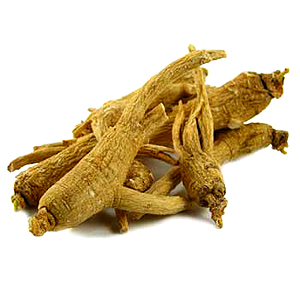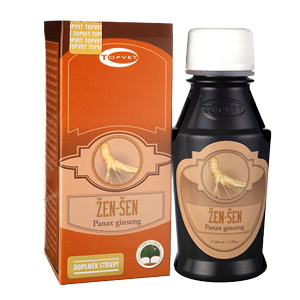No products
Ginseng root tincture - 100ml
Ginseng (Panax ginseng) king of medicinal herbs, it is the strongest means of appreciating Asian medicine and the most effective adaptogen. For centuries, it is used for the treatment and prevention of various diseases. It is a highly effective way to increase energy, relieve stress, promote mental functions, but the most important is its effect in the prevention of cancer...
![]()
Description of herb
Ginseng (Panax ginseng) - a perennial herb 30-60 cm tall grows naturally in the eastern regions of Heilongjiang, Jilin and Liaoning provinces in northeastern China, as well as in eastern Russia in the Ussuri River region, the Maritime Region and in the southern part of the Khabarovsk Krai and in the mountains of North Korea.
The underground part consists of a massive root head, from which grow 1-2 sparsely branched roots, reaching a length of up to 20 cm and a thickness of up to 3 cm. Ginseng's roots resemble the human body and contain a wide range of active ingredients that have made it probably the most famous medicinal plant and is now widespread throughout the world as a means of complementary treatment and nutrition. The root is either dried in the sun to form the so-called white Ginseng (Radix Ginseng album) or steamed in a sugar or herbal infusion and then completely dried with artificial heat, creating the so-called red Ginseng (Radix Ginseng rubrum). For use, it is usually sliced or powdered to make ginseng extracts, syrups and tablets.
Ginseng root extract helps maintain physical and mental performance, stimulates vitality, supports brain activity and strengthens memory. It helps maintain the proper functioning of the immune system, which also strengthens it. It acts as an adaptogen, helps to better manage stressful situations, encourages fatigue and exhaustion, supports the activity of the nervous system. Helps maintain sexual function. It has a beneficial effect on the state of the circulatory system, supports blood circulation and hematopoiesis. Accelerates recovery and delays the signs of aging.
Healing effects
Antitumor effects of Ginseng
Ginseng has numerous beneficial effects in any stressful situation, including cancer. However, ginseng also appears to have the ability to promote cancer treatment with a direct anti-tumor effect.
Antitumor effects can be divided into three areas:
- direct cytotoxic and antitumor effect
- inhibition of metastasis and reduction of tumor cell malignancy
- inhibition of vascular growth in tumors
Ginseng as a medicine for cardiovascular diseases (atherosclerosis, hypertension, myocardial infarction)
Ginseng is an extremely effective remedy for hypertension (high blood pressure). As one of the few drugs, in addition to reducing pressure, it also offers long-term regeneration of the cardiovascular system and treatment of related diseases (atherosclerosis, diabetes, metabolic syndrome).
Cardiovascular effects of Ginseng
Ginseng activates the vascular endothelium and NO synthase III. The protective and activating effect of a mixture of ginsenosides on the endothelium has been known for many decades. Ginsenosides increase NO synthesis, prevent endothelial damage and protect against myocardial infarction. Ginseng causes a direct reduction in blood pressure by dilating blood vessels. Two of the ginseng ingredients, ginsenoside Rg1 and ginsenoside Rg3, act on the nitric oxide molecular signaling cascade. The effect of vasodilation and improvement of axillary is shared by Ginseng with sildenafil (Viagra). Unlike sildenafil, which increases the sensitivity of vascular muscles to nitric oxide (NO), ginseng facilitates the production of NO by the cells of the vascular lining (endothelium).
Ginseng in the treatment of varicose veins and hemorrhoids
Hundreds of scientific papers have been published on the healing effect of Ginseng on the heart and arteries, and it is not surprising that Ginseng also has a healing effect on veins, especially the veins of the lower extremities, which are very similar in structure to arteries. The mechanisms of the healing effect of ginseng on varicose veins are the strengthening of healing processes through the nitric oxide (NO) pathway and the reduction of leukocyte adhesion to the venous wall.
The effect of Ginseng on potency and fertility
Most men taking Ginseng experience a noticeable and relatively long-term improvement in their erections. However, as in many other cases, Ginseng has been shown to have several independent positive effects in the area of sex and fertility. It's not just an easily noticeable improvement in erection. With its other effects, Ginseng contributes to the improvement of the overall physical and mental condition and vigor, which is positively reflected in the entire process of intimate intercourse from the very beginning. With this versatile effect, Ginseng falls far beyond what is commonly referred to as an aphrodisiac.
Neuroprotective effects of Ginseng
Ginseng has been shown to have a positive effect on the mental functions of healthy individuals, but also protective effects against brain cell death in the face of aging stress, intoxication (such as alcohol) or in disease states such as stroke. At least some of these protective effects appear to be due to the anti-inflammatory and sedative effect of panaxosides on microglia - modified CNS-based macrophages.
Ginseng in flu prevention
Ginseng increases resistance to influenza and other viral diseases, improves the effectiveness of vaccination and is also used in the treatment of already developed diseases. Ginseng directs the attention of the immune system more towards a cytotoxic response at the expense of an antibody response. This means that our immune system will be more concerned about viral infections and tumor growth under the influence of Ginseng.
Active substances
Ginseng contains mainly saponins, antioxidants, polysaccharides and peptides. As early as 1854, the first glycoside was isolated from Ginseng and named panaquilone. In 1906, the first saponin, panaxin, was isolated. Since then, more than 70 different saponins have been isolated from Ginseng. These are collectively referred to as ginsenosides or panaxosides. Maltol, salicylic acid and vanilla acid are the main antioxidants in Ginseng. The acidic polysaccharide ginsan was also isolated from the root of ginseng, which, among other things, has been shown to have a significant stimulating effect on the immune system.
The main component of Ginseng is its glycosides called Ginsenosides and a large spectrum
- Amino acids
- Peptides
- Polysaccharides
- Vitamins
- Daukosterin
The whole spectrum of individual ginsenoside subforms differs precisely in their pharmacological activity. They are derivatives of protopanaxadiol, protopanaxatriol and oleanolic acid monodesmoside.
Properties
Adaptogen, Antioxidant, Anabolic, Immunomodulator, Neuroprotectant
Recommended at
As a preventive and cure (according to diseases):
- Cardiovascular diseases
- high blood pressure (hypertension)
- atherosclerosis and arteriosclerosis
- varicose veins and hemorrhoids - Mental disorders
- depression
- Alzheimer's disease
- epilepsy - diabetes mellitus
- obesity/anorexia
- high cholesterol
- viral diseases, influenza
- cancer
- injuries, constipation, indigestion
- anti-inflammatory and anti-allergic effects
- erectile dysfunction
- nausea, hangover, intoxication
As adaptogen (depending on load)
- Improving mental performance
- activation in case of fatigue
- normalization of stress
- mood normalization
- improving concentration
- improving memory and intelligence
- improving potency and fertility - Effect on physical performance
- anabolic effect
- increase performance - Protection against harmful effects
- immunomodulatory effect
- neuroprotective effect
- antioxidant effect
Dosing
1-2 ml 3 times a day (15-30 drops).
Ginseng is completely safe regardless of dosage. Higher doses are recommended for acquaintance and first experience with Ginseng. These will allow you to clearly observe the effect of Ginseng and gain a sense of dosage. The specific dose depends on your sensitivity. Repeatedly take higher doses for several days. If the effects seem too high, reduce the daily dose. If, on the other hand, you still do not feel anything after 2-3 days, increase the dose gradually. You do not have to worry about high doses - Ginseng does not harm even in the tens of grams. When testing, keep in mind that the effect of Ginseng may start slowly.
Side effects
Side effects of Ginseng can practically exclude only those with high blood pressure, diseases of the cardiovascular system are advised to consult a doctor. Not suitable for children under 3 years of age, pregnant and nursing women.
REMEMBER: Tell all your health care providers about any complementary health practices you use. Give them a full picture of what you do to manage your health. This will help ensure coordinated and safe care.



